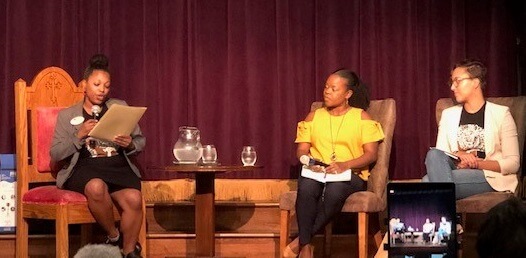
Discussing Black Maternal Health and Domestic Violence
Every year, pregnancy-related complications kill about 700 women. That’s bad enough, but the racial disparity makes it even worse: Compared to white women, black women are three times more likely to die because of pregnancy.
Ujima: The National Center on Violence Against Women in the Black Community wants more people to learn about this gap and, more generally, that too many black women and black babies suffer avoidable deaths. Ujima provides culturally specific services and resources about domestic, sexual, and community violence. Says its Executive Director, Gretta Gardner, “We hope to bring awareness that will spur conversations in the community about how we have to rely on each other to reduce harm and raise awareness instead of relying solely on systems and institutions.”
So two weeks ago (on Monday, October 14), Ujima held an event at Busboys and Poets in Anacostia to discuss black maternal health and how it relates to domestic violence. The program was one of over thirty District events held in October for Domestic Violence Awareness Month. Moderated by Ujima Senior Policy Attorney Megan Simmons, the panel featured two reproductive-rights leaders: Dr. Jamila Perritt (a local OBGYN and member of the District’s Maternal Mortality Review Committee) and Jessica Pinckney (Vice President of Government Affairs at In Our Own Voice: National Black Women’s Reproductive Justice Agenda).
The panelists were blunt about the relationship between domestic violence and maternal health. “Many folks who will someday become pregnant or potentially become mothers or parents have often experienced some type of abuse or violence in their life,” said Pinckney. And “there is no way to separate the trauma or that experience from both the experience of being pregnant and the experience of being a parent.”
In fighting these problems, the panelists stressed, there’s no substitute for knowing about reproductive justice and its history. As Dr. Perritt explained, “If you don’t understand reproductive justice, you will continue to see inequities.” And, she added, “you can’t understand the inequalities with medical care unless you understand the history.” Because of this history, for instance, some African-Americans distrust medical professionals; that distrust can affect the quality of care delivered and received. As a result, doctors and other medical providers need to ask better questions to learn whether someone is a victim of violence: “You have to ask if something is going on.”
Unfortunately, quite a bit is going on. According to the National Network to End Domestic Violence, last year District domestic-violence organizations served an average of 589 victims—each day. Bit by bit, groups like Ujima are working to change that.
Learn more about Ujima, Inc. here.






